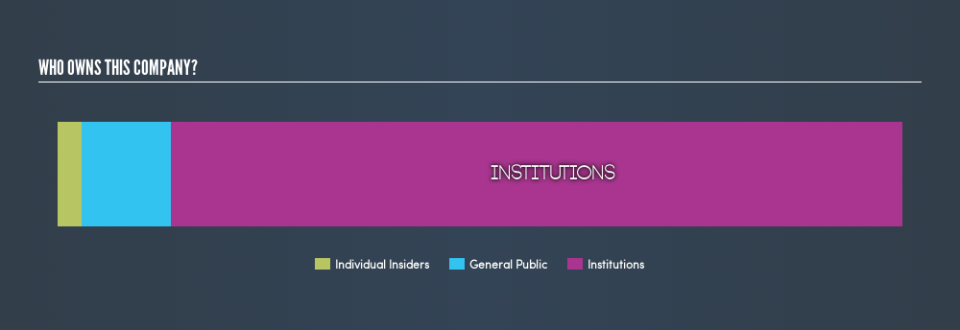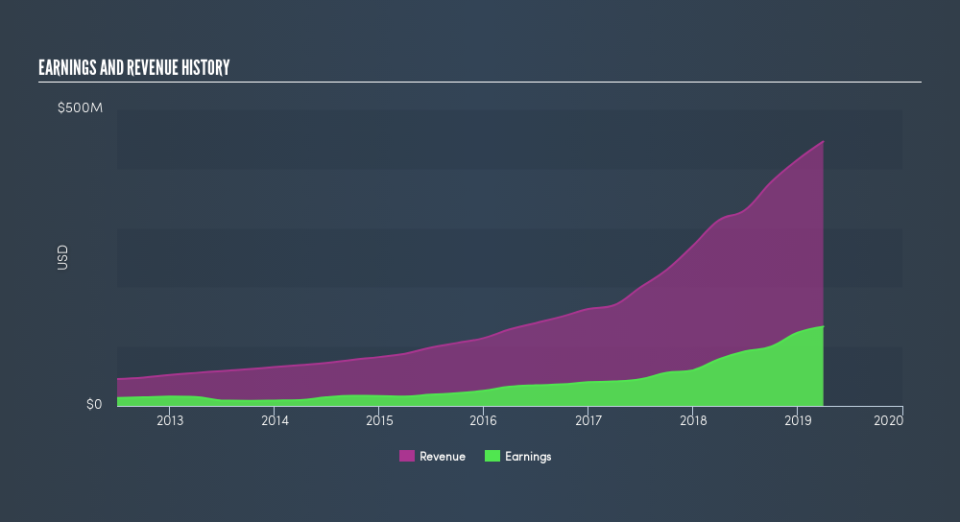Can We See Significant Institutional Ownership On The Pacific Premier Bancorp, Inc. (NASDAQ:PPBI) Share Register?

Want to participate in a short research study? Help shape the future of investing tools and you could win a $250 gift card!
The big shareholder groups in Pacific Premier Bancorp, Inc. (NASDAQ:PPBI) have power over the company. Insiders often own a large chunk of younger, smaller, companies while huge companies tend to have institutions as shareholders. Companies that used to be publicly owned tend to have lower insider ownership.
Pacific Premier Bancorp isn't enormous, but it's not particularly small either. It has a market capitalization of US$1.9b, which means it would generally expect to see some institutions on the share registry. In the chart below below, we can see that institutional investors have bought into the company. Let's delve deeper into each type of owner, to discover more about PPBI.
View our latest analysis for Pacific Premier Bancorp
What Does The Institutional Ownership Tell Us About Pacific Premier Bancorp?
Institutional investors commonly compare their own returns to the returns of a commonly followed index. So they generally do consider buying larger companies that are included in the relevant benchmark index.
We can see that Pacific Premier Bancorp does have institutional investors; and they hold 86% of the stock. This suggests some credibility amongst professional investors. But we can't rely on that fact alone, since institutions make bad investments sometimes, just like everyone does. If multiple institutions change their view on a stock at the same time, you could see the share price drop fast. It's therefore worth looking at Pacific Premier Bancorp's earnings history, below. Of course, the future is what really matters.
Investors should note that institutions actually own more than half the company, so they can collectively wield significant power. Hedge funds don't have many shares in Pacific Premier Bancorp. Quite a few analysts cover the stock, so you could look into forecast growth quite easily.
Insider Ownership Of Pacific Premier Bancorp
While the precise definition of an insider can be subjective, almost everyone considers board members to be insiders. The company management answer to the board; and the latter should represent the interests of shareholders. Notably, sometimes top-level managers are on the board, themselves.
Insider ownership is positive when it signals leadership are thinking like the true owners of the company. However, high insider ownership can also give immense power to a small group within the company. This can be negative in some circumstances.
I can report that insiders do own shares in Pacific Premier Bancorp, Inc.. This is a big company, so it is good to see this level of alignment. Insiders own US$57m worth of shares (at current prices). Most would say this shows alignment of interests between shareholders and the board. Still, it might be worth checking if those insiders have been selling.
General Public Ownership
With a 11% ownership, the general public have some degree of sway over PPBI. This size of ownership, while considerable, may not be enough to change company policy if the decision is not in sync with other large shareholders.
Next Steps:
It's always worth thinking about the different groups who own shares in a company. But to understand Pacific Premier Bancorp better, we need to consider many other factors.
Many find it useful to take an in depth look at how a company has performed in the past. You can access this detailed graph of past earnings, revenue and cash flow .
But ultimately it is the future, not the past, that will determine how well the owners of this business will do. Therefore we think it advisable to take a look at this free report showing whether analysts are predicting a brighter future.
NB: Figures in this article are calculated using data from the last twelve months, which refer to the 12-month period ending on the last date of the month the financial statement is dated. This may not be consistent with full year annual report figures.
We aim to bring you long-term focused research analysis driven by fundamental data. Note that our analysis may not factor in the latest price-sensitive company announcements or qualitative material.
If you spot an error that warrants correction, please contact the editor at editorial-team@simplywallst.com. This article by Simply Wall St is general in nature. It does not constitute a recommendation to buy or sell any stock, and does not take account of your objectives, or your financial situation. Simply Wall St has no position in the stocks mentioned. Thank you for reading.



